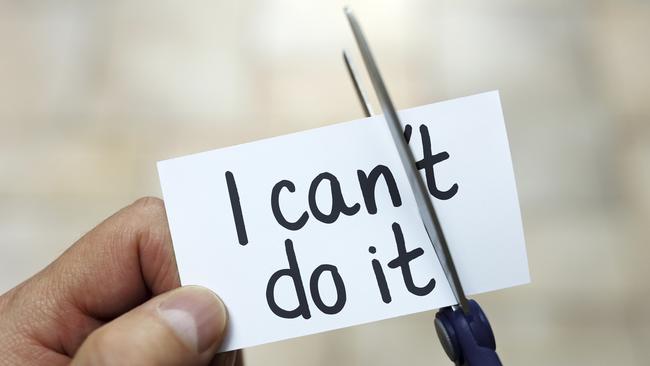Positive thinking: how to reboot your inner optimist
Just saying ‘cheer up’ won’t work. Take a deep breath and focus: these tips may make you feel more positive amid pandemic blues.

After 2020 did its worst — and this year is continuing in an alarmingly similar fashion — it’s hardly surprising that so many of us feel in need of a mental reboot. But how do you rekindle optimism and restore your self-confidence? Well, Don Macpherson knows what’s guaranteed not to work. “Telling someone to ‘think positively’ is the single worst platitude that I hear rolled out,” says the author of a new book on the subject, How to Master Your Monkey Mind (Bantam Press). “How can you think positively when your mind is in a fog of anxiety or panic? It’s just a slightly more eloquent, but ultimately foolish way of telling someone with clinical depression to ‘cheer up’.”
A mind coach whose clients include Olympians and former elite sports professionals such as Damon Hill and Pat Cash, Macpherson says that straightforward positive thinking — long extolled as a route to happiness — is now considered far from a self-fulfilling prophecy. Instead, he says that research has revealed a wealth of more subtle — and reliable — mental tools that will see people through the worst that life can throw at them. Here, he and other experts reveal their favourite tricks of the trade when it comes to boosting positivity.
PRACTISE ZEN BREATHING
Macpherson says that even some marathon runners he works with have forgotten how to breathe well, a recipe for increased anxiety. “If your breath is shallow, you are more likely to become anxious – the shallow breaths we take mean our lungs do not fill fully with oxygen, which can lead to feeling short of breath, fuelling feelings of anxiety,” he says. “Of all the mental tools I have used in my 25-year career, the one that has produced the best feedback from clients is called Zen or diaphragmatic breathing.”
To do it, find a quiet space and lie on the floor, placing one hand on your tummy/abs and the other hand on your chest to check you are engaging your diaphragm. “As you gently breathe in and out, the hand that moves up or down the most must be the one on your tummy,”

Macpherson says. “If you find the hand on your chest is moving up and down, then your breathing is too shallow — focus on breathing using your diaphragm until your tummy moves up and down.”
Start counting to three as you breathe in slowly through the nose, then hold the breath for a couple of seconds before releasing it (through the nose or mouth) to a count of five, six, seven, eight or nine. “The trick is to make the out-breath longer than the in-breath because your heartbeat actually speeds up slightly when you breathe in, but when you breathe out your heartbeat slows down,” he says. “A longer out-breath also means the full intake of replenishing oxygen is matched by carbon dioxide being fully exhaled from the body, which elicits the relaxation response.”
Practise Zen breathing once or twice a day for a few minutes at a time to reduce anxiety and cut panic attacks. “If you are really struggling to focus on your breathing, then try humming as you breathe out,” Macpherson says. “It is actually very difficult to think at the same time as you hum, and the sound itself also tells your brain and body that you are relaxed. Many sportspeople hum when they feel under stress, and it can help with your Zen breathing too.” There’s plenty of proof that it can help, with studies showing that it triggers body relaxation responses, lowers levels of stress hormones, such as cortisol, in the body and benefits physical and mental health long-term.
MAKE MORE TIME
Greg Whyte is a professor of sport at Liverpool John Moores University and the author of Achieve the Impossible (Bantam Press). He has advised several celebrities — including David Walliams, Davina McCall and John Bishop — and says one of the commonest excuses he hears from clients is that they haven’t got time to take on something new, be that going to the gym or training for a marathon.
“For most of us the absence of time is not because we are too busy — which is invariably true for everyone — but usually the result of two factors: poor time management and poor communication,” Whyte says.

“One of the most interesting experiments you can ever undertake yourself is to use the stopwatch on your smart phone to time all the periods in a day you could use for something more productive — all those coffee breaks and extended lie-ins, the screen scrolling and social media surfing — be ruthless and you will see how much time you really can make.”
It can make a big difference to work output and stress levels. Studies have shown that better time management is associated with lower levels of anxiety, and last year researchers at the University of West London reported that among a group of students, less time spent procrastinating about tasks and improved time-management skills translated to higher academic performance, regardless of gender, age and entry qualifications.
MIND YOUR LANGUAGE
According to Macpherson, we each experience about 60,000 thoughts a day, most of which are regurgitated or “on loop” from previous days. Many of these have no psychological impact, but repeated negative thoughts and words can have “a devastating, disempowering, weakening effect on your ability to perform well”, he says. German researchers have been able to show that negative words result in the release of stress and anxiety hormones, while a different study of children found that negative self-talk correlated with higher rates of anxiety.
The key to nipping negative thinking in the bud is to recognise when it is happening, Macpherson says.
“Sit or lie down somewhere comfortable and turn your attention to what is going on in your head. Don’t interfere with the process, just casually observe with childlike curiosity. Within the negative chatter you will discover all sorts of words that your brain is listening to thousands of times a day, words that make up thoughts that in turn can have a very negative effect on your wellbeing, as well as your view on – and experience of – life.”
An example is the phrase “I will try” to do something, which Macpherson says was once his “default” phrase and implies an element of self-doubt – setting you up to fail. “If you ‘try’ to get fit, do you really think you will? If you ‘try’ to cut back on alcohol, how long do you think that will last?” Macpherson says. “Instead of thinking, ‘I’ll try’, I began to use ‘I’ll do my very best’, or just ‘I’ll give it a go’. Better still, ‘I will do this’.”

It is not easy to implement changes to in-built vocabulary, but persist. Macpherson says: “Many of these thoughts and words are well meaning, but ultimately extremely unhelpful, so you have to strip them out of the daily dialogue you have with yourself.”
SWITCH YOUR FOCUS
Dr Jennifer Wild, a consultant clinical psychologist and associate professor at the University of Oxford as well as the author of Be Extraordinary (Robinson), says that tweaking what you focus on — and how you focus — can transform your mindset. “People who manage stress well and are positive choose to focus on what they can do rather than on what they can’t,” she says. “They appreciate they don’t have endless years to will their goals into reality, so they optimise their time, and we can all learn to do this by focusing efficiently without distraction.”
Researchers at Kings College London working with a group of people diagnosed with generalised anxiety disorder found three effective approaches to dealing with negativity: conjuring up positive mental images associated with one’s concerns; generating positive images not related to one’s concerns; focusing on using positive language for worry-related outcomes.
Wild says it is unhelpful to focus inwardly on feelings, fears and even on sensations such as a rapid heartbeat. Instead we should take a step back and switch our focus to a wider context. “More helpful attention is the kind of attention that’s out of your head and into the world,” she says. “For example, if I was worried about blushing and focused all of my attention on my face when I was giving a talk, I’d soon lose my train of thought and would be working hard to cover up my rosy cheeks with my hands or hair, which would be distracting and draw more attention to me. If, instead, I focused on my talk it would make me feel more at ease.”
REMAIN REALISTIC
If you have set yourself any goals for 2021, ask yourself if you have made them too hard. “One of the main reasons for failure in anything is the setting of unrealistic, unachievable goals,” Whyte says. “If something is worth achieving it will require a commitment to work hard, but remember that every goal is personal and if you have never run before, then taking on a 5km run might be a more realistic but no less rewarding challenge than taking on a multiday endurance race in the Sahara.”
The importance of remaining realistic was shown in a study by researchers from the University of Bath and the London School of Economics and Political Science last year. They looked at financial expectations in life compared with actual outcomes over an 18-year period and discovered that realists enjoyed better long-term wellbeing than those who over-estimated outcomes. They stressed that negative thinking should not replace positive since optimists and pessimists fared badly compared with realists.

“Plans based on inaccurate beliefs make for poor decisions and are bound to deliver worse outcomes than would rational, realistic beliefs,” says Dr Chris Dawson, associate professor in business economics at Bath’s school of management and one of the paper’s authors.
BE KIND TO YOURSELF
Constant self-criticism zaps motivation, and researchers have shown that being too harsh on yourself is not helpful in overcoming adversity. One study, published in the journal Psychological Science, found that divorcing or separating adults displayed improved emotional resilience and recovery if they also exhibited some self-kindness. And researchers at the University of Glasgow concluded that higher levels of self-compassion – speaking kindly to yourself — not only reduces the harmful effects of stress, but is associated with lower levels of anxiety and depression.
“Self-compassion is the ability to extend kindness towards ourselves in times of pain or failure, the capacity to normalise our difficult experiences by recognising that people around the world have similar struggles and that our struggles are a part of the larger human experience,” Wild says. “It’s also about being able to see painful thoughts and feelings as passing rather than defining.”
Kristin Neff, an associate professor of educational psychology at the University of Texas at Austin, has shown in numerous studies that self-compassion is linked to a host of positive emotions, including happiness, partly because it creates feelings of connection with others and a sense of balance or equilibrium. “Feelings of compassion for oneself and others is linked to greater activation of the left prefrontal cortex, the part of the brain linked to joy and optimism,” Wild says. “A self-compassionate mindset also improves coping skills and could help you feel more optimistic about the future.”
It might even improve your body image. At the University of Texas, psychologists found that undergraduate students who practised self-compassion were not only happier and more optimistic, but were less preoccupied with their appearance and had fewer worries about weight than those who were prone to self-criticism in all aspects of their lives.
The Times







To join the conversation, please log in. Don't have an account? Register
Join the conversation, you are commenting as Logout